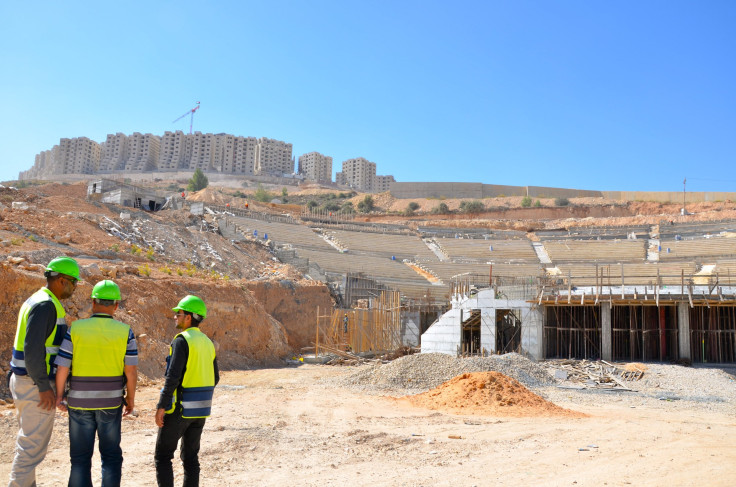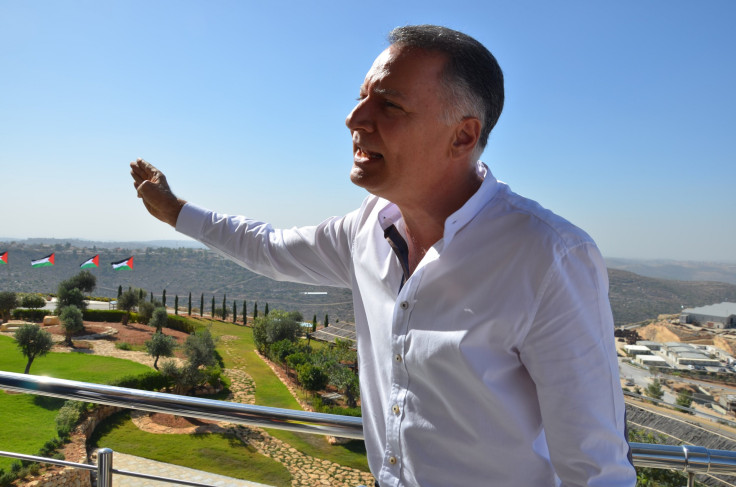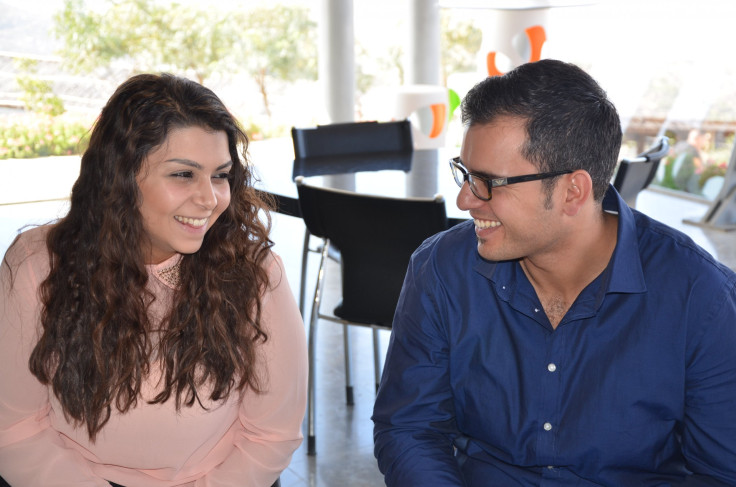A Self-Contained City Inside A Conflict Zone: Millionaire American-Palestinian Investor Plans High-End, High-Tech Development In West Bank

RAWABI, West Bank – Millionaire American-Palestinian developer Bashar Masri’s 10-year mission to build a high-end, high-tech city in the volatile West Bank is as audacious as it is ambitious, so it comes as no surprise that there have been setbacks.
Masri’s plans to prove Palestinian economic might are hampered by everyday problems related to life under Israeli occupation, from bureaucratic red tape to difficulty gaining the necessary access to water and roads.
Yet on this day, Masri, 52, stands on the balcony of the contemporary Rawabi sales headquarters, which towers over a construction site, a remote hilltop halfway between Nablus and Ramallah.
The giant Palestinian flag flaps in the wind behind him, overshadowing the smaller Palestinian flags beside it; the flag also flies in the face of a neighboring Jewish Israeli settlement of 100 families called Ateret on a lower hilltop.
Masri’s plans call for the Rawabi development to house up to 40,000 people and serve as a high-tech business hub. The first 600 apartments will be ready early next year, and already 8,000 families and individuals have queued up for a place to live there.
Masri hasn’t been able to guarantee that water will be on tap next year for the first residents, and he concedes the project is two years behind schedule, held up by access to water and difficulties obtaining permits to build an access road through a part of the West Bank under exclusive Israeli control -- the so-called “Area C” defined by the Oslo peace accords.
“Frankly, I have no choice but to be confident about Rawabi -- look behind me and you see the massive construction going on, and I can’t afford to stop at this point. Is it a risk? It’s a very high risk. Do I have guarantees I will get water? Absolutely not,” he said.

In 2007, the Israeli Government assured Masri he would be granted a permit for a large access road to be built through Area C that would be able to withstand up to 100 trucks a week during construction and enough cars to cater to 40,000 residents once construction is complete.
Last year, a permit was granted, but for a significantly scaled-back version of the road. In July, construction began and trucks were able to begin bringing in supplies to Rawabi, including water from Israel to mix concrete onsite. By the end of the week, concrete pouring usually stops abruptly when the water supply runs out. Masri said he can spend 70 percent of his time dealing with issues related to water and access.
“We have had hardly any breakthroughs in the project, and we only got that little dingy road after five years of struggling, and we got a road that looks nice like a country road, but it’s certainly not a road to sustain a quarter of a city, let alone a full city, and it doesn’t even go all the way,” he said. “The water is half a kilometer away from us; the pipeline is so close and it supplies an Israeli settlement. We have to beg and negotiate and put pressure on them [the Israeli government] to get water to bring, and we’re not bringing people from the moon, we’re just moving people from one area of the West Bank to another area, so we’re not affecting the total consumption of water.”
Israel controls nearly all of the water supply in the West Bank, and its 600,000 Israeli settlers in the West Bank and East Jerusalem consume almost six times as much water as their 2.7 million Palestinian neighbors.
Masri is scathing in his criticism of the fact that 60 activists came to the Rawabi construction site from Ateret, the nearby Israeli settlement, in 2010 to protest against it, saying it would lead to the end of the Area C status that Ateret residents enjoy. Activists allegedly also stole a Palestinian flag from the Rawabi headquarters. Masri has rejected offers of building supplies from settlements as well as Israeli overtures to offer advice on how to model Rawabi.
“Life is sometimes about principles, beliefs and about emotions," Masri said, adding that he does not think Israeli occupied settlements should exist. "Settlers are evil people in general that continue to harass our people; they continue to live on our land illegally, and it’s recognized by almost the whole world as being illegal. We do not deal with illegal bodies or illegal issues,” he added. “It’s very important that people realize this project is not about showing that we are happy under the occupation -- this project is despite the occupation. [It’s] that we the Palestinian people can do and deserve a state. We hope that the occupation will end and end very soon.”
Masri’s battle is twofold: overcoming the logistical barriers with Israel and the lack of support from fellow Palestinians and the Palestinian Authority.
Palestinian activists in the Boycott, Divestment and Sanctions movement, which espouses the belief that Israel should be economically isolated, have accused Masri of “normalizing” the Israeli occupation of the West Bank because he deals with Israeli businesses and institutions. Masri admits he’s taken inspiration from Modi’in, an Israeli town on the Green Line, but he denies Rawabi emulates Jewish settler housing.
Masri wishes more wealthy Palestinians like him would return to Palestine from abroad and inject some of their wealth into the economy to support its growth. He said an increase in the number of Palestinian middle-income earners is helping the country have a stronger identity through a healthy economy. But, he said, the Palestinian Authority has also held up Rawabi’s development in its own way by not delivering on promised financial support for the infrastructure of the city.
Four years ago, the Palestinian Authority agreed to finance $150 million for providing power, water, sewerage, schools and roads, but it never happened. Buyers are now picking up the tab, adding 10 to 12 percent to the cost of their houses.
“We should not be building and financing the public schools, the sewerage treatment plant or the water reservoir, or the water network. We should not be building the roads, the green parks; it should be the government,” Masri contends.
In 2007, when he came up with the idea to build Rawabi, Masri believed the Palestinian Authority would be happy to financially back the proposed city. A third of the $US1 billion needed for the project came through his primary company, Massar International, and the rest came through Bayti (“my home”), his property investment company, which won backing from Qatar Diar, the real estate investment arm of the Qatari Government’s sovereign wealth fund.
Massar, which means “path” in Arabic, has interests in real estate, financial services and consulting. The company founded Al-Ayyam, a daily newspaper, which is now the second-largest in Palestine. Masri, meanwhile, made headlines of his own in 2011 when he tried to buy a bankrupt Jewish housing development in East Jerusalem.
Massar International owns a private equity fund called Siraj Fund Management Company, which invests in Palestinian agriculture and natural gas distribution. It runs travel agencies in Jordan and brokerage firms in Serbia, and it invests in Harvest Export, which sells Palestinian produce to consumers in Israel, Russia and Western Europe.
Masri said Qatar Diar expects to receive a low return on its investment, but he is backing the project to support the development of the West Bank as a region. He also said it was unclear if Massar would break even.
“When the Qataris invested, the projected return was 8.5 percent,” Masri said. “The risks in the project were humongous; no investor with their right investment mind would make such an investment. Since we started the project and because of the delays and poor responses from other donor nations in building the infrastructure, the return on the project has dropped to 2.9 percent. In Palestine, you could put your money in the bank and get that return,” he said.
The Qataris have invested widely as a form of branding in Arab nations and areas, and in 2009 they donated half the funds needed to build Doha Stadium in a small Arab Galilee town called Sakhnin.
In October last year, Sheikh Hamad bin Khalifa al-Thani visited the area and pledged $400 million to Gaza. It caused a furor with both Israel and the Palestinian Authority, which saw it as recognition of Hamas’ rule. The Qatari Emir was the first Arab ruler to visit Gaza since Hamas control began in 2007. Qatar supports Islamists in Egypt, Tunisia, Gaza and Syria.
Nation building
All of which means that there are sensitivities to any assertion of economic power in the West Bank. Still, Masri said he believes in the project so much that he plans to live in a penthouse in Rawabi’s business center once it has been built.
Raised in Nablus as a member of a wealthy business family, he studied engineering in Egypt and the U.S. As a businessman in the 1990s, he divided his time between Washington, D.C., and Ramallah, and he spent some time building low-income housing in Morocco before deciding he wanted to attempt something big in Palestine. He had started out as a student activist in the 1970s, when he did time in an Israeli jail. He likes to say he was a “rock-thrower” in his youth, but that his opposition to the occupation is now more sophisticated. “This project is to prove to ourselves -- we don’t need to prove to anybody else -- that we can build our nation, and our nation is not just building a government. It’s also having a better economy, better human rights, having a better social life.”
If the showroom models and the 3D sales pitch are anything to go by, Rawabi will cater to both liberal lifestyles and the traditional Palestinian. A promotional video shows women with uncovered long hair and men in suits on cell phones alongside others in full Islamic attire. It shows a gleaming Rawabi center, which the sales team notes will be Palestine’s first high-tech city, with an underground fiber optic network connecting offices and homes intended to attract media companies and ICT businesses. Buildings are faced with local stone from an onsite quarry with elaborate archways flowing onto cul-de-sacs linked to green spaces.
The city center of retail stores, cafes, restaurants, cinemas and a convention center are built around a central pedestrian street. A mosque and a Greek Orthodox church are also being built, as is an amphitheater at the lower end of the site. Masri has banned the use of water tanks that punctuate the West Bank skyline because he says they’re unsightly. Instead, the town will have pressurized water from a reservoir.
Upward Mobility
Rawabi is deliberately geared to middle-income Palestinians as the cost of apartments range between $60,000 and $200,000. The sales managers say the majority of buyers so far are educated, two-income families, but that seven percent of buyers are single professional women. Up to 11 percent of the buyers are Christian, which is higher than the average for Palestine.
Among the new buyers, newlyweds Yara Abdallah, 25, and Montaser Hamdan, 27, say they are not worried about the uncertainty over water supply. They are taking a leap of faith and have made a $12,300 deposit on an apartment worth $123,000, and they are taking out their first mortgage. They say the only concern they have about Rawabi is a spot checkpoint between there and Ramallah that is sometimes closed and would stop them from getting to work.

“Rawabi offers a better life than Ramallah, and it’s cheaper,” Montaser said, adding, “It’s something that makes us very proud, because it’s proved that we can build a state.”
“It’s not just any project -- the Palestinian situation is really complicated and things are not easy,” Yara said. “It can’t be done easily. To see this project becoming real and developing day-by-day is something that makes us proud.”
Spokesman for Israel’s Foreign Ministry Yigal Palmor said the access road had been a complex issue as the original road was set to go through both Palestinian residents' and Israeli settlers' land.
“Rawabi is a positive venture because we support anything that enhances economic growth in Palestine and this does that -- it’s a very positive initiative,” Palmor said. “The land had to be expropriated, and Israel didn’t want to go first in fear Palestine would use it as political leverage. Israel said we will expropriate the land if you go first, and [when] nothing happened, an alternative route through Government-only land was reached.”
Palmor added, “It’s politically sensitive as the fate of Area C as a whole is being negotiated.”
Masri said that the project has generated up to 5,000 jobs for Palestinians, but he also wants to ensure that low-income families are not left out of the long-term equation, and he added that he will announce plans to build low-cost housing at Rawabi in two years. For now, he said, wages paid to Palestinian workers onsite are 30 percent higher than the Palestinian minimum wage. (Last year the Palestinian Authority introduced the minimum wage, which is low by Western standards -- $US2.50 an hour, or about US$400 to $450 a month. The minimum wage in Israel is three times as high.)
For now, Masri’s dreams of upward mobility, economic development and popular tolerance must endure the familiar setbacks and checkpoints that have characterized the West Bank for years. Though the project has injected money into the local economy, in Masri’s view its true success depends on its completion and full occupancy.
“That’s when you can send me an email to say congratulations, your idea succeeded,” he said.
© Copyright IBTimes 2024. All rights reserved.




















